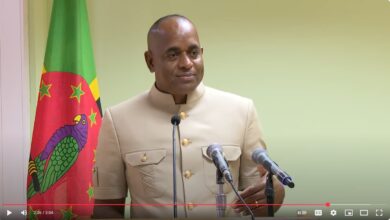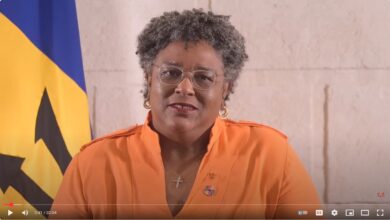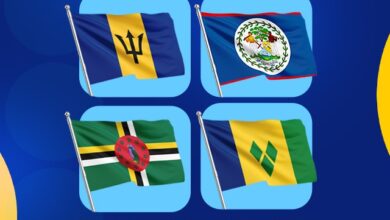Colleague Prime Ministers, Ministers of Trade, Senior Officials and Members of the CARICOM Secretariat and the CARICOM Regional Negotiating Machinery Staff, I welcome you warmly to Montego Bay
Jamaica is a country in transition and expansion and, its second city Montego Bay, is in the forefront. As you look around, you will see the many signs of infrastructural development. I ask for your understanding and we must apologize for any inconvenience suffered. As a tourism centre, Montego Bay is an example of how trade in services has become central to many of our CARICOM economies. Please make sure you take some time out during your stay to enjoy some of the sights and sounds of this fast growing city.
Friends, this is a crucial year for CARICOM in our external economic negotiations as we seek to consolidate the Single Market and progress towards the Single Economy. Our objectives in all these areas are integrally related. Prime Minister Arthur and I recognized early that our two Sub-Committees must work closely together if the Region is to achieve these objectives. It is for that reason we agreed to convene this historic Joint Meeting at the very beginning of the year.
This Meeting is historic in two ways. First, it brings together the discussions of our internal and our external effort at fostering our development around one explicit regional development vision.
Second, it provides a practical demonstration of the capacity and flexibility of our institutional structures to adapt in the effort to achieve our common goal. This Joint Meeting does not have two agendas or one agenda in two parts. It has a single agenda. It is directed to one purpose – the best way to achieve and sustain progress for the Caribbean people.
We are a small Region, of small countries, but with people with great ambitions and big hearts. Our people have always recognized the need to embrace the external world and to use it to our advantage. We are seeking today to grasp that external world and to use it, not to our individual advantage; not just to the advantage of Barbados, Trinidad and Tobago or Jamaica; but to our collective advantage.
In order to do that, we have to be going in the same direction. It is for that reason that the common vision we will consider in St. Vincent and the Grenadines next week is so important. The vision must encompass using our collective resources to advance our collective interest. The implementation of our Single Market must make the resources of the Region, wherever they are, available to all the countries of the Region to use effectively. It is the access to, and the effective use of our collective resources which will make us internationally competitive as a Region. That is the task which Prime Minister Arthur and his CSME Sub-Committee is about.
It is the responsibility of the Prime Ministerial Sub-Committee on External Negotiations to ensure that we have the most receptive and fair international environment in which to implement this vision and to compete. In order to negotiate the best external conditions and with the most appropriate country or group of countries, we must know how the Region intends to use its productive resources. We must know what to negotiate for and with whom. This takes us quickly back to the development vision.
Our Trade Ministers and Officials met for the past two days and what has become clear is the wide-ranging and demanding agenda for external trade negotiations that lies before us. Coming out of its deliberations, we are charged to give careful thought to a number of issues. We must come to firm decisions on some key matters, including:
1) The strategic focus and direction of our negotiations in the context of the ACP/EU EPA;
2) The nature of CARICOM’s relationship with the wider Caribbean Basin Community including the Dominican Republic. More generally, we need to decide on how we want to approach our bilateral relations;
3) The implications of the resumption of multilateral trade negotiations in the World Trade Organization;
4) Our approach to the Region’s export trade in sensitive primary commodities like bananas and sugar and;
5) Our approach to our trade and economic relations with our North American neighbours – the United States and Canada.
We will be guided by the goals and objectives for the CARICOM Single Market and Economy (CSME). Our challenge is to build a community based on a unity which is not imagined but real and directed to a new vision for our Region and society. In these changing times we are charged to build new ways of communicating among ourselves especially where there could be conflicting national objectives. I look forward to a frank exchange of views over the next two days and I hope to witness our new institutional innovation at work as we share thoughts on the range of issues before us in this Joint Meeting. The recognition that the mandates of the different institutions in the Community are inter-dependent should be the essential element which drives our interaction not only in this Meeting or Meetings of Heads of Government but at the Ministerial level as well as at the level of our technicians.
You will note that our agenda includes not only an exchange of views on the development vision for the Caribbean Community but also on Governance. I believe it will afford us the occasion not for more academic thinking but for practical stocktaking. Given the establishment of the CSME in January 2006, there is now the need in our discussions to begin to audit the extent to which our primary goals and objectives of integration are leading to the building of community. We all know the admonition – integrate or perish. In deepening our integration and governance processes, it is time for us to look to a more creative approach to how we structure our institutions and our inter-state relations. We need to forge our own unity and norms as we seek to extend our borders and economic and trading interests with the wider Region, including the Dominican Republic, the hemisphere and the world.
We need to address how we balance people’s lives and our other goals and complex demands. I suggest colleagues that we have a major task ahead of us and it is this: How do we meet our historical obligation to ensure that Caribbean people, wherever they are, participate in creating a social and economic landscape that is a significant improvement on the experience of the generations which went before?.
As we work through our agenda over the next few days, I would challenge all of us to keep in view our historical obligation and the central objectives of the integration process that are now finding expression in the CSME. Let us, in addition to striving to deepen the socio-economic and cultural elements in all our countries, also seek to bring to the fore the best in all our nation-states. Let us work to transform our several economies into a more coherent, efficient, cohesive and competitive Region which will ensure a better quality of life for the majority of our people.
As I end these remarks, I must use the opportunity to say that I look forward to welcoming all of you back for the Opening Ceremony of the ICC World Cup in March – not too far from here when we launch our most ambitious cooperative endeavour yet. That will be a unique chance to showcase not only the strength of our unity but the best this Region offers to the world. We will succeed with all of us – Leaders and citizens – working together.
Once again, a warm welcome to Jamaica, and to Montego Bay where the regional integration process began to take shape almost fifty years ago.





